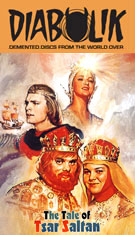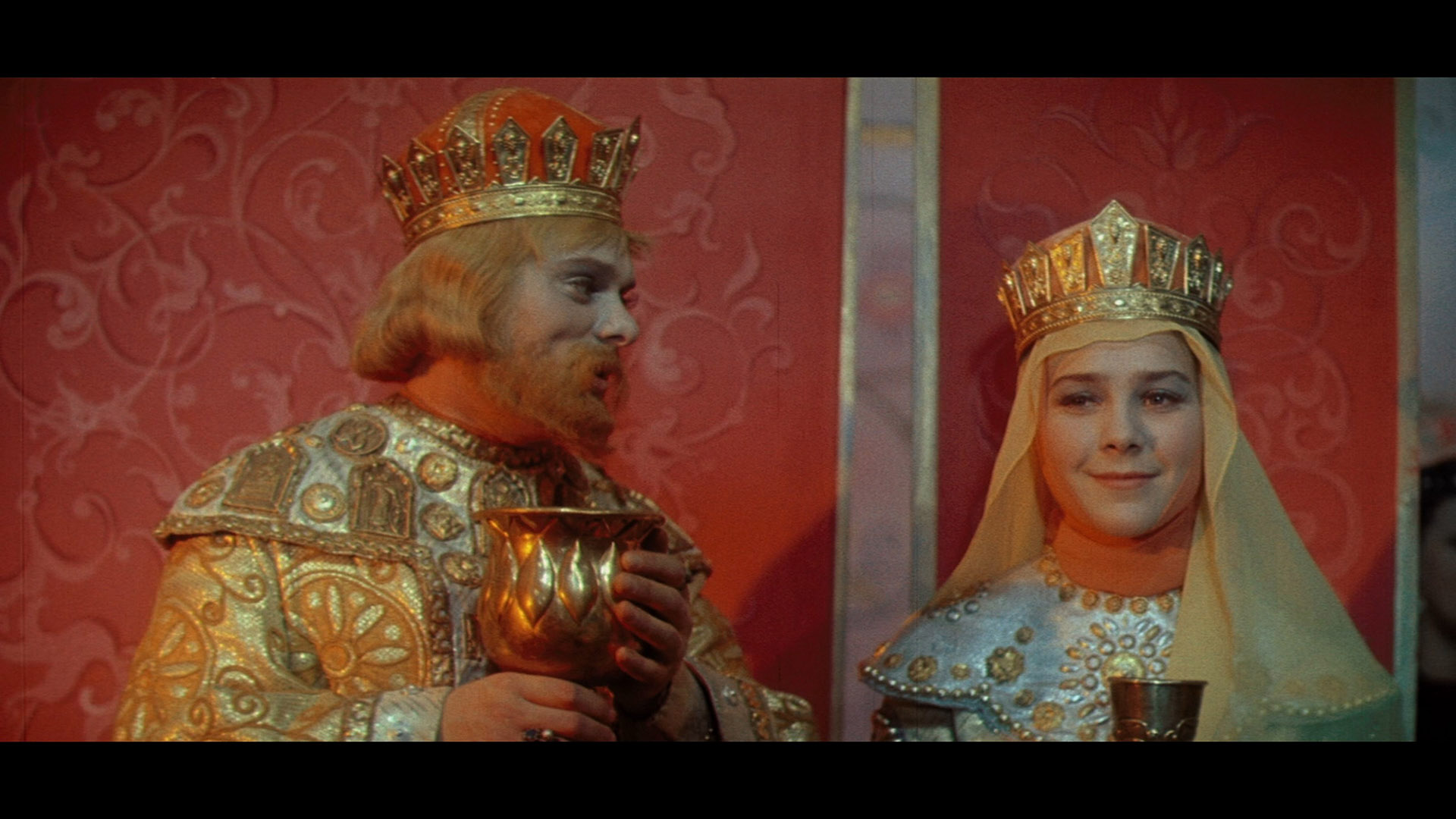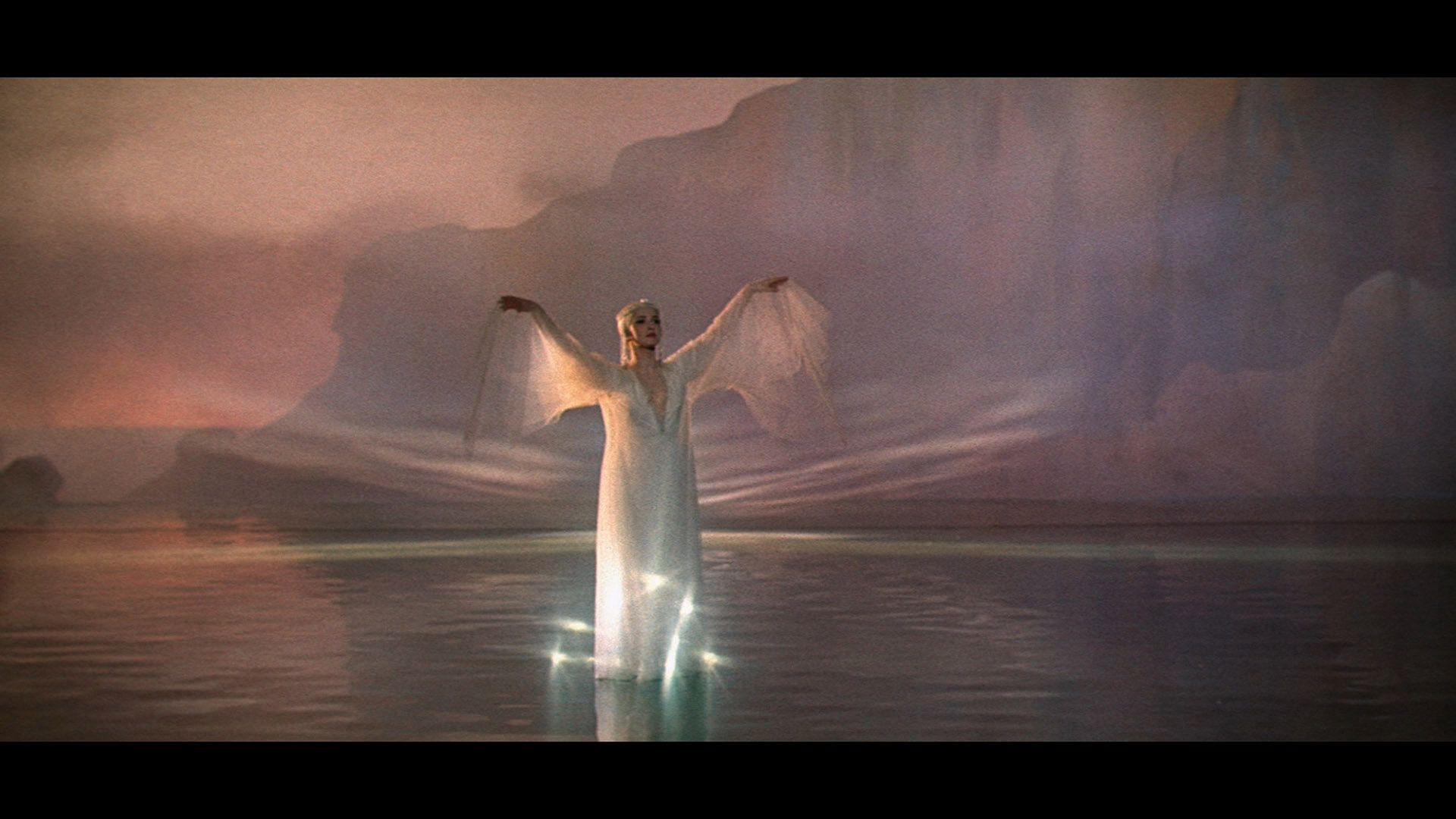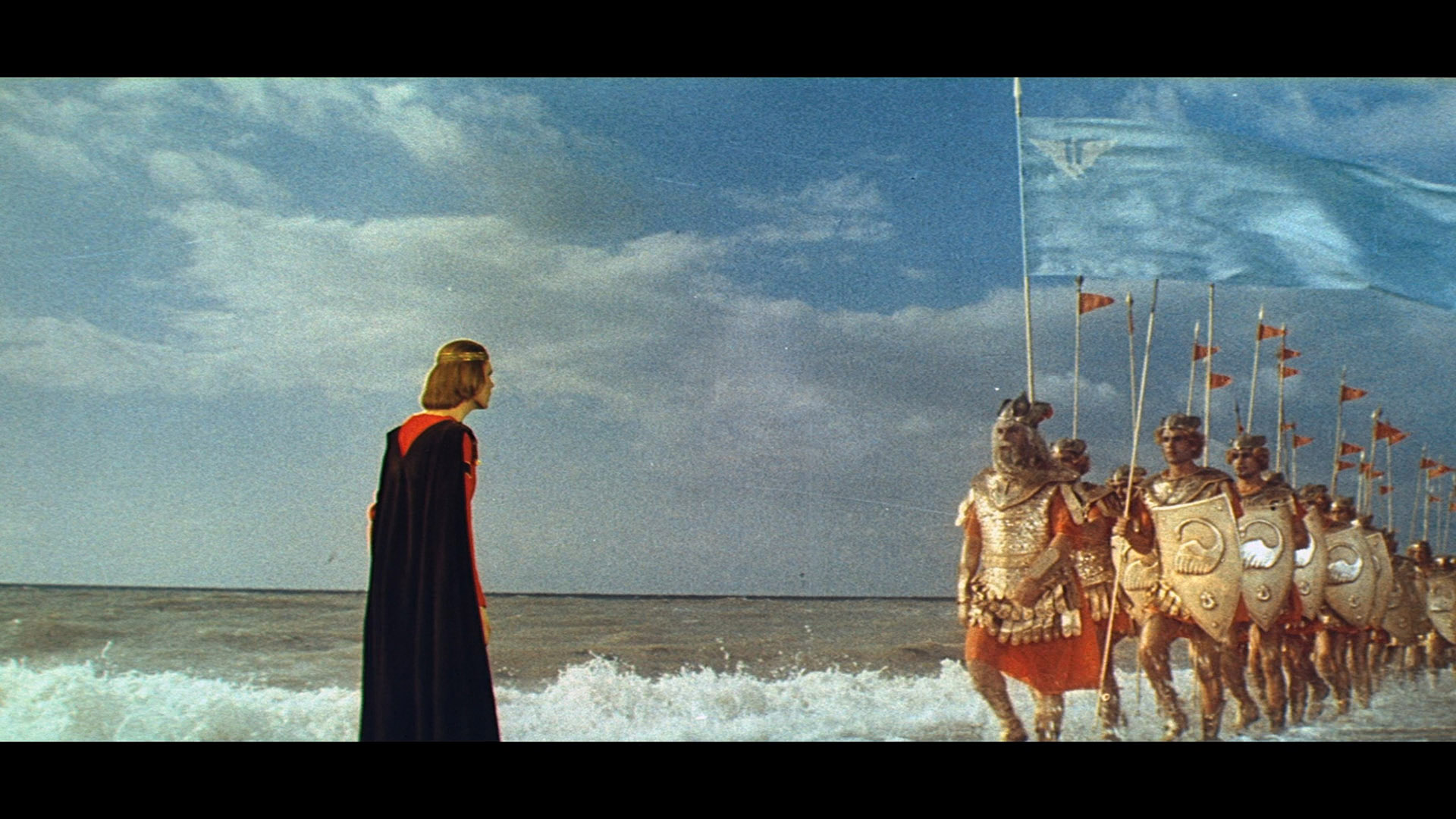

Color, 1966, 85 mins. 9 secs.
Directed by Aleksandr Ptushko
Starring Vladimir Andreyev, Larisa Golubkina, Oleg Vidov, Ksenia Ryabinkina
Deaf Crocodile (Blu-ray) (US RA HD), Ruscico (DVD) (US R1 NTSC) / WS (2.20:1) (16:9)
The penultimate feature film from  legendary Russian filmmaker Aleksandr Ptushko, The Tale of Tsar Saltan is another unfettered dive
legendary Russian filmmaker Aleksandr Ptushko, The Tale of Tsar Saltan is another unfettered dive  into saturated color fantasy shot on a wide scale. Despite the title, the sprawling storyline (which crams a lot into less than 90 minutes!) involves far more than just Tsar Saltan (Andreyev), a ruler who chooses a wife among three sisters who each profess what they would do as a member of royalty. The chosen Tsarina (Golubkina) ignites jealously among her two siblings, who bide their time until the birth of a royal son. The two sisters conspire to trap the mother and child in a wooden cask and sent adrift into the sea, but instead of a death sentence the waves was them up on a remote, mystical island. Grown to adulthood, the male heir grows to become Prince Gvidon (Vidov) after a benevolent, life-saving gesture to an enchanting Swan Princess (Ryabinkina), who also comes up with unorthodox method for him to see his father who had been away for years waging war against troll-like creatures.
into saturated color fantasy shot on a wide scale. Despite the title, the sprawling storyline (which crams a lot into less than 90 minutes!) involves far more than just Tsar Saltan (Andreyev), a ruler who chooses a wife among three sisters who each profess what they would do as a member of royalty. The chosen Tsarina (Golubkina) ignites jealously among her two siblings, who bide their time until the birth of a royal son. The two sisters conspire to trap the mother and child in a wooden cask and sent adrift into the sea, but instead of a death sentence the waves was them up on a remote, mystical island. Grown to adulthood, the male heir grows to become Prince Gvidon (Vidov) after a benevolent, life-saving gesture to an enchanting Swan Princess (Ryabinkina), who also comes up with unorthodox method for him to see his father who had been away for years waging war against troll-like creatures.
As with many of Ptushko's other films, Tsar Saltan balances traditional cinematic pageantry with whimsical, idiosyncratic touches of supernatural fantasy like the princess herself (who radiates shimmering light on the water), sentient carved lions, a scene-stealing musical squirrel, and the prince's ability to  transform into a reconnaissance bug. While three of Ptushko's prior films were picked up for U.S. distribution and
transform into a reconnaissance bug. While three of Ptushko's prior films were picked up for U.S. distribution and  heavily altered to camouflage their national origins, this one was unseen in the U.S. for several decades and earned international distribution in a smaller handful of markets (notably Japan, South America, and Continental Europe). That's a shame as this is a knockout of a sensory experience with a vivid, unearthly color scheme and dynamic multi-channel sound design that could compete with the best of the big-budget epics being turned out that decade.
heavily altered to camouflage their national origins, this one was unseen in the U.S. for several decades and earned international distribution in a smaller handful of markets (notably Japan, South America, and Continental Europe). That's a shame as this is a knockout of a sensory experience with a vivid, unearthly color scheme and dynamic multi-channel sound design that could compete with the best of the big-budget epics being turned out that decade.
As with almost all of Ptushko's other output, a restoration of this film was presented on DVD from Ruscico in an English-friendly edition, first for European consumption and then officially given U.S. distribution by Image Entertainment in 2002. Following up on their essential restored editions of Ilya Muromets and Sampo, Deaf Crocodile released a Blu-ray in 2023 that provides a stellar viewing experience all around. Easily outclassing the earlier DVD, this looks and sounds incredible with the stylized vistas and immersive sound mix (presented here in Russian DTS-HD 5.1 with  optional English subtitles) making this a real treat in
optional English subtitles) making this a real treat in  every way. (Here's hoping Ptushko's last film, the epic Rusland and Ludmila, will get the same treatment at some point, too.) In keeping with the earlier titles, legendary artist and genre expert Stephen Bissette delivers a new commentary talking about possible reasons for the film's lack of U.S. distribution back in the day, its ties to other Ptushko films, the use of fairy tale conventions even down to touches in the staging and costuming choices, and the way the central conflict is conveyed through the use of fantastic imagery. On the video side, an interview with Oscar-winning visual effects artist Robert Stotak (69m36s) with with Deaf Crocodile's Dennis Bartok goes into the artistry and influence of the techniques in Ptushko's films, which had a major international impact on nascent filmmakers even in their altered U.S. forms. The disc also comes with an insert featuring a new essay by film historian and professor Peter Rollberg about the Alexander Pushkin source verse, the state of Soviet cinema at the time, and the various meanings it would have carried for local audiences.
every way. (Here's hoping Ptushko's last film, the epic Rusland and Ludmila, will get the same treatment at some point, too.) In keeping with the earlier titles, legendary artist and genre expert Stephen Bissette delivers a new commentary talking about possible reasons for the film's lack of U.S. distribution back in the day, its ties to other Ptushko films, the use of fairy tale conventions even down to touches in the staging and costuming choices, and the way the central conflict is conveyed through the use of fantastic imagery. On the video side, an interview with Oscar-winning visual effects artist Robert Stotak (69m36s) with with Deaf Crocodile's Dennis Bartok goes into the artistry and influence of the techniques in Ptushko's films, which had a major international impact on nascent filmmakers even in their altered U.S. forms. The disc also comes with an insert featuring a new essay by film historian and professor Peter Rollberg about the Alexander Pushkin source verse, the state of Soviet cinema at the time, and the various meanings it would have carried for local audiences.
Reviewed on June 3, 2023



 legendary Russian filmmaker Aleksandr Ptushko, The Tale of Tsar Saltan is another unfettered dive
legendary Russian filmmaker Aleksandr Ptushko, The Tale of Tsar Saltan is another unfettered dive  into saturated color fantasy shot on a wide scale. Despite the title, the sprawling storyline (which crams a lot into less than 90 minutes!) involves far more than just Tsar Saltan (Andreyev), a ruler who chooses a wife among three sisters who each profess what they would do as a member of royalty. The chosen Tsarina (Golubkina) ignites jealously among her two siblings, who bide their time until the birth of a royal son. The two sisters conspire to trap the mother and child in a wooden cask and sent adrift into the sea, but instead of a death sentence the waves was them up on a remote, mystical island. Grown to adulthood, the male heir grows to become Prince Gvidon (Vidov) after a benevolent, life-saving gesture to an enchanting Swan Princess (Ryabinkina), who also comes up with unorthodox method for him to see his father who had been away for years waging war against troll-like creatures.
into saturated color fantasy shot on a wide scale. Despite the title, the sprawling storyline (which crams a lot into less than 90 minutes!) involves far more than just Tsar Saltan (Andreyev), a ruler who chooses a wife among three sisters who each profess what they would do as a member of royalty. The chosen Tsarina (Golubkina) ignites jealously among her two siblings, who bide their time until the birth of a royal son. The two sisters conspire to trap the mother and child in a wooden cask and sent adrift into the sea, but instead of a death sentence the waves was them up on a remote, mystical island. Grown to adulthood, the male heir grows to become Prince Gvidon (Vidov) after a benevolent, life-saving gesture to an enchanting Swan Princess (Ryabinkina), who also comes up with unorthodox method for him to see his father who had been away for years waging war against troll-like creatures.  transform into a reconnaissance bug. While three of Ptushko's prior films were picked up for U.S. distribution and
transform into a reconnaissance bug. While three of Ptushko's prior films were picked up for U.S. distribution and  heavily altered to camouflage their national origins, this one was unseen in the U.S. for several decades and earned international distribution in a smaller handful of markets (notably Japan, South America, and Continental Europe). That's a shame as this is a knockout of a sensory experience with a vivid, unearthly color scheme and dynamic multi-channel sound design that could compete with the best of the big-budget epics being turned out that decade.
heavily altered to camouflage their national origins, this one was unseen in the U.S. for several decades and earned international distribution in a smaller handful of markets (notably Japan, South America, and Continental Europe). That's a shame as this is a knockout of a sensory experience with a vivid, unearthly color scheme and dynamic multi-channel sound design that could compete with the best of the big-budget epics being turned out that decade.  optional English subtitles) making this a real treat in
optional English subtitles) making this a real treat in  every way. (Here's hoping Ptushko's last film, the epic Rusland and Ludmila, will get the same treatment at some point, too.) In keeping with the earlier titles, legendary artist and genre expert Stephen Bissette delivers a new commentary talking about possible reasons for the film's lack of U.S. distribution back in the day, its ties to other Ptushko films, the use of fairy tale conventions even down to touches in the staging and costuming choices, and the way the central conflict is conveyed through the use of fantastic imagery. On the video side, an interview with Oscar-winning visual effects artist Robert Stotak (69m36s) with with Deaf Crocodile's Dennis Bartok goes into the artistry and influence of the techniques in Ptushko's films, which had a major international impact on nascent filmmakers even in their altered U.S. forms. The disc also comes with an insert featuring a new essay by film historian and professor Peter Rollberg about the Alexander Pushkin source verse, the state of Soviet cinema at the time, and the various meanings it would have carried for local audiences.
every way. (Here's hoping Ptushko's last film, the epic Rusland and Ludmila, will get the same treatment at some point, too.) In keeping with the earlier titles, legendary artist and genre expert Stephen Bissette delivers a new commentary talking about possible reasons for the film's lack of U.S. distribution back in the day, its ties to other Ptushko films, the use of fairy tale conventions even down to touches in the staging and costuming choices, and the way the central conflict is conveyed through the use of fantastic imagery. On the video side, an interview with Oscar-winning visual effects artist Robert Stotak (69m36s) with with Deaf Crocodile's Dennis Bartok goes into the artistry and influence of the techniques in Ptushko's films, which had a major international impact on nascent filmmakers even in their altered U.S. forms. The disc also comes with an insert featuring a new essay by film historian and professor Peter Rollberg about the Alexander Pushkin source verse, the state of Soviet cinema at the time, and the various meanings it would have carried for local audiences.